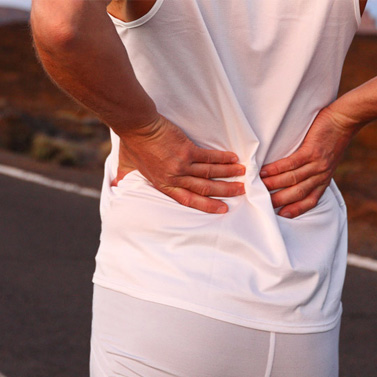
A “slipped disc” is medically referred to as a prolapsed or herniated disc.
This occurs when one of the discs that sits between the spinal vertebrae is damaged and presses on the surrounding spinal nerves.
This can cause back pain or neck pain, as well as symptoms such as numbness, tingling sensation, and/or weakness.
The sciatic nerve is often affected in cases of a prolapsed disc. It is the longest nerve in the body and runs from the back of the pelvis, through the buttocks and down both legs to the feet.
If pressure is placed on the sciatic nerve (sciatica), it can cause mild to severe pain in the leg, hip or buttocks.
What causes a “slipped disc”
The spine consists of 24 individual bones called vertebrae that are stacked on top of each other.
In between each vertebra there are protective circular pads of connective tissue called discs. They have a tough, fibrous case that contains a softer gel-like substance. The discs help maintain your back’s flexibility and act as shock absorbers.
A slipped disc occurs when the outer case of the disc splits, resulting in the gel inside bulging out of the disc.
The damaged disc can put pressure on the whole spinal cord or on a single nerve root, where a nerve leaves the spinal cord, resulting in a compressed nerve root
It is not always clear what causes a disc to break down, although age is a common factor in many cases. As you get older, your spinal discs start to lose their water content, making them less flexible and more likely to rupture.
It’s important to note not all slipped discs cause symptoms such as pain, weakness or tingling. Many people will go their whole life and not know they have a slipped disc, as you can be completely symptom free.
Managing a “slipped disc”
An accurate diagnosis of your back pain through your Chartered Physiotherapist or GP is essential to your successful management of your pain and associated symptoms.
At PhysioPlus, we will take a comprehensive subjective history of your back pain and carry out a thorough physical examination of all your symptoms to ensure we have accurately diagnosed your back pain.
If your back pain is related to a “slipped disc” our Chartered Physiotherapists at PhysioPlus will implement a combination of manual therapy, soft tissue massage, joint mobilisations and manipulations in order to release the pressure (nerve root compression) on the affected areas.
Poor management of spinal conditions can lead to many recurrent episodes with increasing severity of symptoms over time.
No matter what stage your back pain is at, it is essential that it is managed effectively and you are educated in how to self manage any recurring episodes.
Contact us at here at PhysioPlus, Chartered Physiotherapy and Sports Injury Clinic, Portlaoise, Co. Laois to manage your pain successfully.
Call Now 057-8660663
